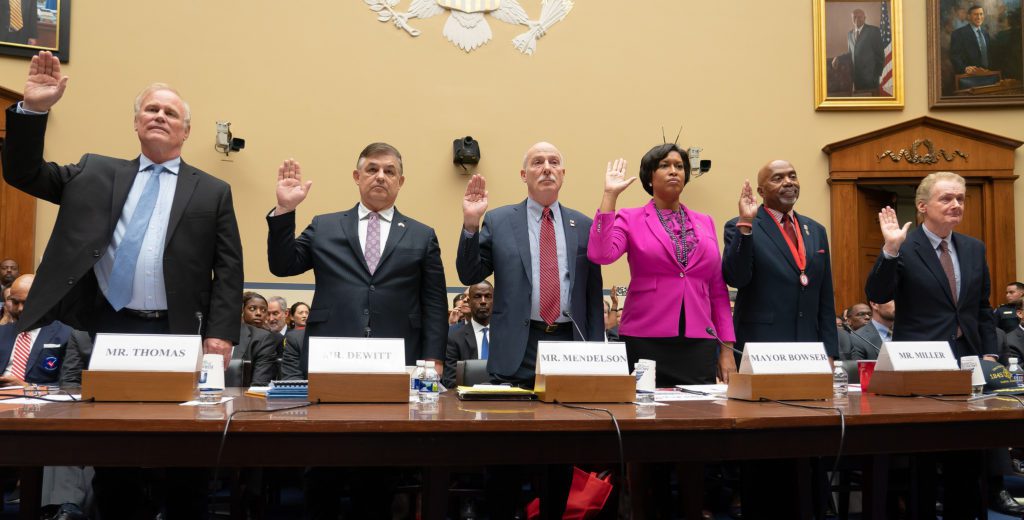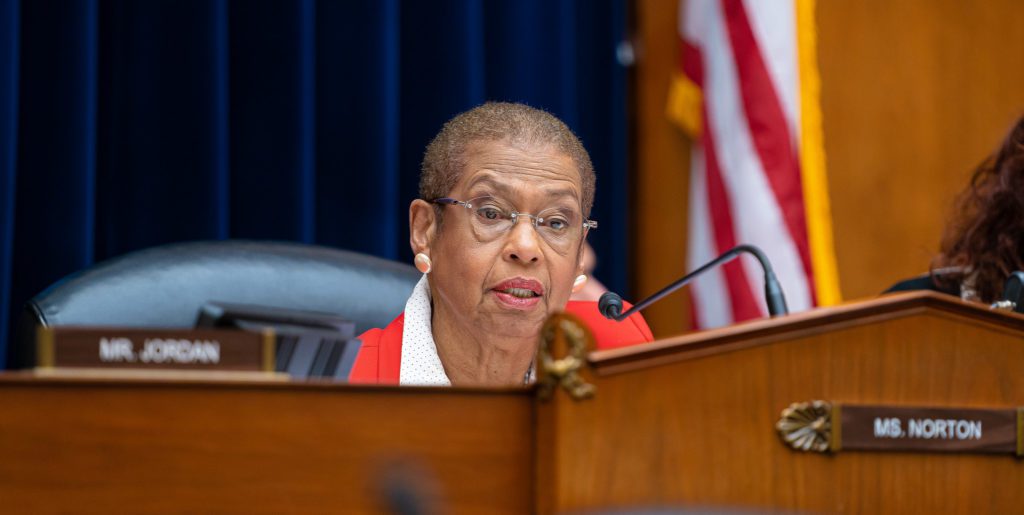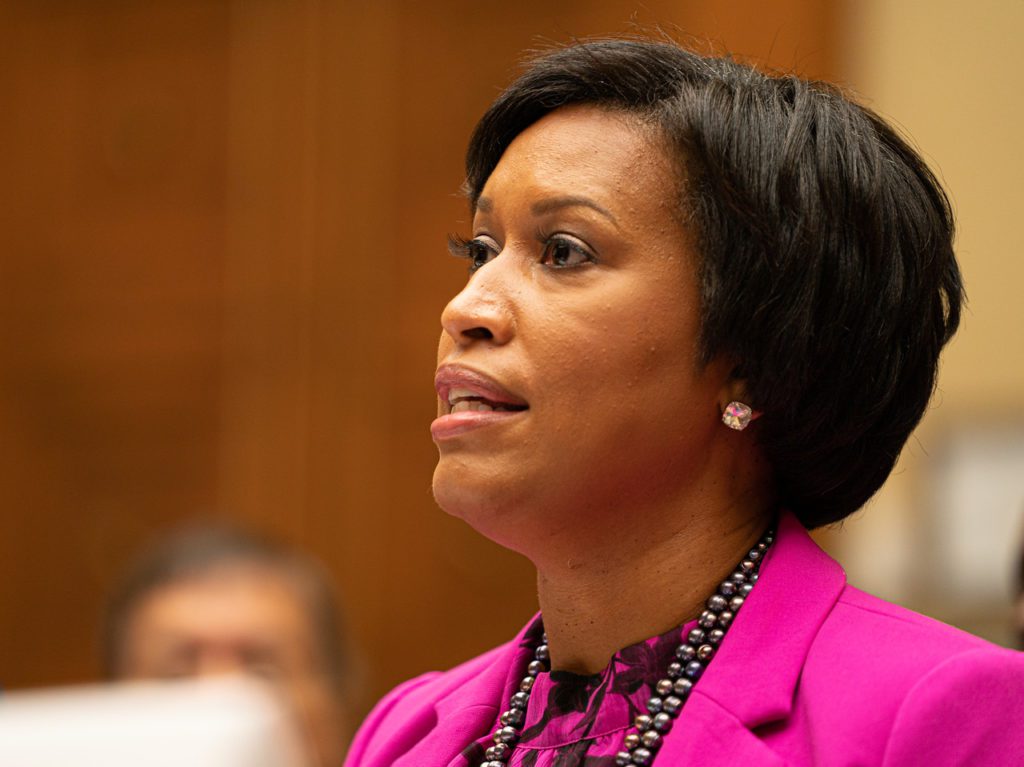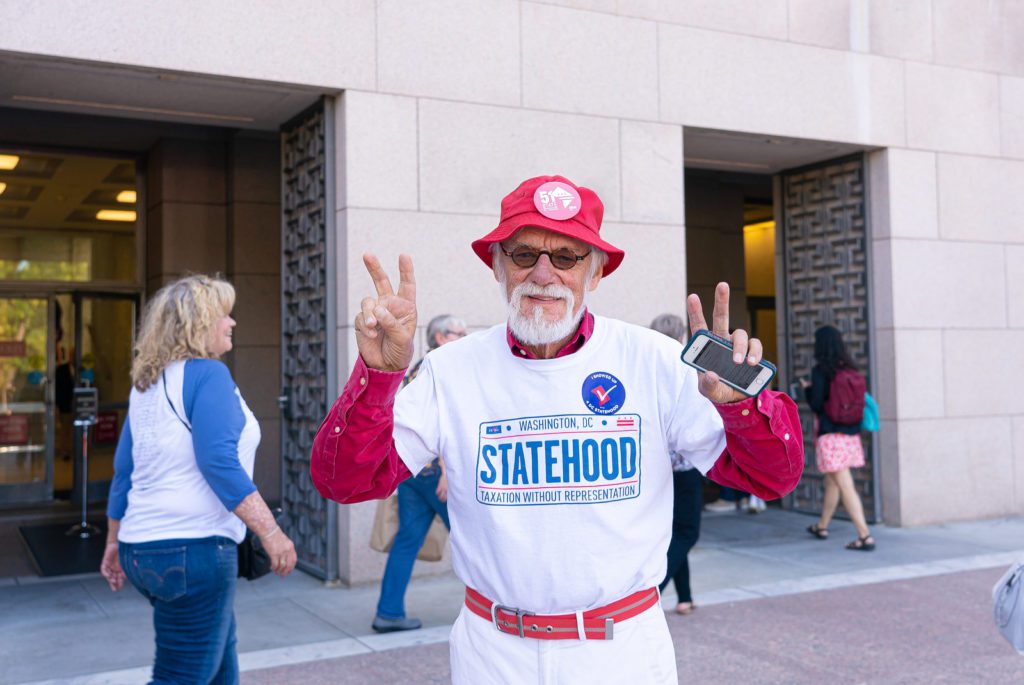Bowser, D.C. Officials Make Compelling Statehood Pitch to Congress
By • September 23, 2019 0 1793

A hearing by the normally staid House Oversight Committee erupted for more than three hours on Sept. 19, with Mayor Muriel Bowser and other District officials testifying in support of legislation to convert most of the nation’s capital into Washington, Douglass Commonwealth — America’s 51st state — in honor of abolitionist Frederick Douglass.

D.C. Delegate Eleanor Holmes Norton of the House Oversight Committee. Photo by Jeff Malet.
Proposed by Del. Eleanor Holmes Norton (D-D.C.), the legislation would shrink the District — the official seat of the federal government — to two square miles. Ceded by Maryland and Virginia, the original 100-square-mile District (mandated in the Constitution as “not exceeding ten miles square”) became the capital of the young nation in 1790.
The new District would encompass the White House, Capitol Hill, the Supreme Court and most of the federal agency buildings and memorials around the National Mall.
Committee Chairman Elijah Cummings (D-Maryland) has said he has no plans to advance the legislation at the moment, although he intends to hold another meeting to prepare the bill for a vote on the House floor. While many Democrats believe the bill can pass the House with their party in the majority, most do admit publicly that the proposal has no chance to win in the Republican-controlled Senate.
Nevertheless, the debate was passionate — at times contentious, emotional and wonky. It started off with ranking Republican Jim Jordan (R-Ohio) putting a motion on the table to postpone the discussion on statehood until the committee could “assess the cloud of scandal” surrounding Ward 2 Council member Jack Evans. After 10 minutes, the motion was withdrawn.

Mayor Muriel Bowser. Photo by Jeff Malet.
In her testimony, Mayor Bowser — along with District Council Chairman Phil Mendelson, CFO Jeffrey DeWitt and others — argued the following: “To deny statehood to the 700,000 residents of D.C. deprives us not only of full representation, but also of a vote on issues all other American citizens have including on how taxes are appropriated.” They pointed out that D.C. residents pay the highest federal taxes per capita of any U.S. state, concluding, “It is truly taxation without representation.”
Still, Republican lawmakers said they opposed statehood because it would violate the intention of the framers of the Constitution. They also questioned how the new state could pay for the more than $1 billion of expenses that federally mandated funds now cover, such as Medicaid and prison services. District officials argued that with a $15.5-billion budget and a rapidly rising population, the District can financially support itself as a state. “The District expects a population of over one million by 2045,” Bowser said.
The ongoing question, however, was whether a new state actually could be created out of Washington, D.C., by legislation or if a constitutional amendment or revision would be required. Roger Pilon, constitutional studies chair at the libertarian Cato Institute, and Kenneth Thomas, legislative attorney for the Congressional Research Service, spoke about the historical precedents and obstacles facing the creation of such a state.
Maryland and Virginia had originally given the land for the District. (Virginia’s 31-square-mile contribution was retroceded in 1847 due to the District’s anticipated ban on slavery.) Witnesses argued whether or not the original ceding of state land was unconditional, or if Maryland would have to agree to make the District a separate state, since it had originally ceded land in order to create the nation’s capital, not for “a new state on its border.”
Politics also was debated. Bowser and others remarked that Republicans were objecting to D.C. becoming a state because it was likely to elect two Democratic senators, increasing the party’s influence in the Senate. Some, such as Rep. Gerry Connolly (D-Virginia), also insisted that Republican objections were based on racism.
Some of the arguments echoed those in 1993 when — on the Saturday after Thanksgiving, during Norton’s second term in the House and Bill Clinton’s first term as president — a D.C. statehood bill came to a House vote. Only 151 Democrats voted aye, along with one independent, Bernie Sanders of Vermont, and one Republican, Wayne Gilchrest of Maryland. 218 votes were needed to pass.
“In 2009 and ’10, it would seem that Democrats again had a chance to pass statehood,” wrote Georgetowner columnist and D.C. statehood advocate Mark Plotkin in a column on Nov. 24, 2017. “The Democrats controlled the House, the Senate and the White House. But while President Obama paid minimal lip service to D.C. statehood, he never put his office behind the issue.”
Most Americans, in fact, probably do not even know that the residents of Washington, D.C., do not have voting representation in the House or the Senate.

Outside the House Rayburn Building. Photo by Jeff Malet.

